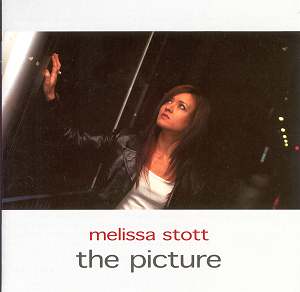Wish It Wasn’t True [7:07] +
You [5:08] +
A Little Contented Place [5:34] ++
Beware of Your Heart [3:50] ++
I Just Can’t Stop The Tears [5:56] +
That’ll Be Us [5:24] +
The Picture [4:39] +
I’m Looking At You With New Eyes [4:06] +
Romance Addio [5:13] +
Cara [4:40] +
Cutch O’Lanza [4:59] +
Mexico Blue [6:05] *, ++
Hindsight [6:05] *, ++
All music and lyrics by Melissa Stott
Melissa Stott (vocal)
Stjepko Gut (trumpet, flugelhorn)
Matteo Raggi (tenor saxophone, bassoon)
Angela Alessi (violin) *
Nico Menci (piano) +
Max Chirico (piano) ++
David Brillante (guitar)
Pietro Ciancaglini (bass)
Alessandro Minetto (drums)
rec. Artesuono Studios, Udine, Italy, 16-17
October 2006
This is a striking album,
technically accomplished, intelligent and
distinctive.
Responsible for all the words
and music, and for most of the arrangements,
Stott is clearly an all-round musician. (According
to her website – http://www.melissastott.com
– she is not only a performer, lyricist and
composer since she also teaches ballet, classical
piano and harmony, jazz singing and choral
singing!).
Certainly there is an assured
musicality to everything on this album. Her
work here has an intimacy which rapidly engages
– and retains – the listener’s attention and
feelings; her lyrics combine a quasi-conversational
directness with a degree of formality which
distances them from the crudely confessional.
Though the CD booklet prints all the lyrics
there really is no need for them – Stott’s
diction is an absolute model of clarity. The
intelligence and well-developed verbal sense
evident in the lyrics is also everywhere apparent
in the phrasing of her singing. The whole
approach is sophisticated and individual,
without ever being remotely pretentious or
wilfully eccentric.
Unlike, say Madeline Peyroux’s
work, which is excessively dependent on the
influence of a single model (Billie Holiday),
Stott’s influences are a good deal more extensive
and various. Some of her writing clearly echoes
the Great American Songbook – some of her
harmonies and melodic lines have something
of Gershwin about them. At other times there
are reminders of Bill Evans. I was fascinated
to read that she had studied with the great
Barry Harris, one of the finest of post-bop
jazz pianists. Her vocal patterns occasionally
suggest an affinity with Anita O’Day and,
maybe Ella Fitzgerald. But the voice itself
affects no imitation of any predecessor and
in most respects she is very much her own
woman; making an album entirely of her own
compositions, removes any excessive temptation
to echo the work of others. Her first album
which I haven’t heard, was also made up of
her own compositions, see review.
There’s an easy swing to
everything here, and she is very well served
by an excellent group of sympathetic accompanists,
a number of whom get their chance to take
solo space – there is some sensitive tenor
work by Matteo Raggi (who also plays a superb
intro to ‘A Little Contented Place’ on bassoon),
Stjepko Gut makes some Clifford-Brownish contributions
on trumpet and flugelhorn and Davide Brillante
plays some striking solos on guitar.
But Stott is at the forefront
of the CD. Her voice has a distinctive, memorable
timbre, a fullness of tone which doesn’t rob
it of agility. Perhaps there isn’t quite the
variety of tonal colour of the truly great
jazz singers, but there’s time for that yet.
Her singing has real emotional substance,
achieved through an approach that is essentially
understated – there’s nothing remotely over
the top here. Highlights include the bossa-nova
rhythms of ‘Cara’, poised on the border between
innocence and experience, the forceful emotional
paradoxes of ‘Wish it Wasn’t True’ and the
witty up-tempo number ‘Romance Addio’. But,
in truth, there isn’t a dull track on the
CD, and even in a time when we seem to be
unusually well-supplied with female vocalists,
this is a CD that deserves to attract attention
and admiration.
Glyn Pursglove
see also review
by Jonathan Woolf
